Check out this link to hear my interview on Iowa Public Radio. Added my "spin" on the ice skating in Iowa, figure skating, coaching and information about how to get involved with the sport in Iowa.
|
http://iowapublicradio.org/post/making-best-icy-winter
Check out this link to hear my interview on Iowa Public Radio. Added my "spin" on the ice skating in Iowa, figure skating, coaching and information about how to get involved with the sport in Iowa.
2 Comments
The Ice Ridge is proud to support the sport of figure skating by providing a way for up and coming athletes to start on the road to the Olympics!
Check out our learn to skate programs! by clicking on this link. Olympic History - Figure Skating Figure skating is the oldest discipline in the Olympic Winter Games. As far back as 1908, figure skating competitions were included in the Olympics in London, and in 1920 at the Antwerp Games. Since the 1924 Olympic Games in Paris, singles and pairs skating have been a key fixture of the Olympic Games. In 1976 ice dancing was included in the Olympic program; prior to this (in 1972) it was the only part of the Olympics as a demonstration sport. Today, figure skating is one of the most popular sports in the world. Figure Skating today The Olympic Games program includes the following figure skating competitions: individual men’s and women’s events, pairs events, ice dancing and also team events. At the present time, only 5 sets of medals are contested in the Olympic figure skating program. Single skating (Men and Ladies) consists of a short program including 7 compulsory elements and a free program. A well-balanced free program should include jumps, spins, and steps. Likewise, mixed pairs skaters first perform a short program (7 moves) and then a free program. Compulsory moves include lifts, spirals, throws and synchronized jumps. One of the most significant criteria in the judging of programs is the degree to which a pairs’ movements mirror one another. Ice Dancing is the only discipline that allows the use of music with vocals. Dancers much adhere closely to the rhythm of the music and express the character of the music with appropriate emotion and feeling. At present, ice dancing competitions, like those of other forms of figure skating, consist of two programs. The short program combines a compulsory dance—consisting of one or two parts—and certain proscribed elements. The theme and rhythm of the musical accompaniment is determined each season by the ISU the sport’s governing body, while the length of this dance—currently 2 minutes and 50 seconds—is similar to requirements of other forms of figure skating. The free dance has not undergone significant changes over the years and the basis of its scoring remains, the quality of the compulsory elements in close dancing positions, the unison the skaters display and their ability to express the character of the musical selection. Team Events in figure skating are a competition between the best national teams. Representatives of the singles and pairs skating perform a short and free program; in ice dancing they complete a short and free dance. Each team may have one sports pair and one dance pair, one male figure skater and one female figure skating. Equipment
Many of our customers have asked..."are you
open all year long?" Are you open yet? The answer is YES! We are OPEN now! 7 days a week during all Mall Hours. Thanks for asking! We hope to see you soon! Many of our customers have asked..."are you
open all year long?" The answer is YES! We are OPEN now! 7 days a week during all Mall Hours. Thanks for asking! We hope to see you soon! Information For New Skaters
SKATING EXPENSES: How much does skating cost? My mother used to answer newcomers by saying, “well first get out your check book”. Like many activities it depends on how intensively you get involved. The following is a summary of costs that skaters may encounter as their training advances. Although this list is intended to provide an idea of the more significant expenses skaters may incur, please realize that it is not comprehensive. While some Club members may never require all of the services listed, other skaters may elect to make investments beyond those mentions here. SKATERS: All skaters need to own at least one pair of well-fitting ice skates (boots). Rentals simply don’t provide the support or blade quality needed for serious skating. Consult your coach about the different options available in boots from used or gently used all the way to custom made. I cannot stress enough the importance of a well-fitted boot to avoid unnecessary foot problems. Never purchase a larger size with the idea of your skater growing into them as this can seriously injure their feet, not to mention create difficulty with balance. A stiffer boot dost not a better skater make! The health and well being of the structure of your skater’s feet will enable them to skate for years to come while avoiding seeing a Podiatrist. SKATE SHARPENING: Skate blades need to be sharpened regularly. The frequency depends on how often your skater trains. Avoid letting blades get too dull as this can impede progress and cause difficulty with simple edge work. Don’t just go to anyone who claims to sharpen blades as there is a true art to this. Talk to more advanced skaters with some time invested in the sport to see where they take their blades to get sharpened. Average cost is about $15.00 to $25.00 a pair. BLADES: Discuss which blade model best suits your skater’s ability with your coach. A more advanced “rocker” will hinder a beginner as it takes more technique to skate on. Don’t buy blades on the advice of another parent as their skater may be more advanced than yours. SKATING ATTIRE: To be comfortable yet safe. Baggy or bell bottomed pants can cause a skater to fall due to blades getting caught in loose material. Tights come in various types from in the boot to over the boot. Some skaters opt to where two pair if skating in a cold rink. Wearing several layers of thin, moisture wicking material works well. As the skater warms up, they can shed outer layers. Gloves help keep hands warm. Look for a stretchy knitted glove that fits well. There are new types of leggings that are a cotton/spandex blend that fit well and go over the boot. These are rather pricey, but work very well. In addition, skaters testing or competing will need special dresses, pants (boys) or costumes. Always make sure skates are well maintained and clean when testing or competing, laces tucked in or taped, as well as making sure hair is well groomed and away from face. PROFESSIONAL COACH: Each Coach or “Pro” charges by the lesson. It is your responsibility to interview the coach and find out his or her policy of payment. This is a business contract between you and your skater’s instructor, so make sure you compensate them according to their policy. With the new ruling by USFS and PSA it is your responsibility to ask your private coach if they are compliant and working on their continuing education requirements, as any coach in a non-compliant status will not be able to attend test sessions, competitions, exhibitions, club ice or any USFS sponsored event with your skater. ICE TIME: Every time skaters take the ice, they essentially rent ice time from the rink. In freestyle sessions, for example, fees reflect the fact that the number of skaters on the ice is limited, allowing skaters to work on advanced skills without the distractions of crowding and recreational beginners. Check with the arena for current freestyle rate and or available “chip” cards. Your expense will depend on how many sessions you skate. TESTING FEES: Each skater must pay a fee upon submitting his or her application for an upcoming test. This fee helps to offset testing costs, such as rental of the ice and judges’ reimbursement for transportation. Rates vary according to the kind of test taken and level. You will be billed by your coach for the time he or she spends with your skater at the test, usually equivalent to fifteen minutes to one hour of lesson time. Check with our Test Chair for information regarding test fees and policies regarding registration. COMPETITION FEES: Every competition charges an entry fee, and these vary widely. In addition to the entry fee, you will be responsible for reimbursing your coach for time spent with your skater at the event. A coach’s lodging and transportation expenses will normally be divided equally among the skaters he or she is taking to the competition. Of course, you will incur travel expenses as well, including lodging and transportation, if the competition is out of town. Skaters may also sign up for practice ice at the competition rink for an additional fee. Check the competition rink’s website for their announcement and registration form for all costs and available practice ice. MUSIC: Music is an essential component to the success of any program. Coaches devote a great deal of time off the ice to cutting music for the best effect while adhering to competition time limitations. All coaches charge a fee for such program editing and recording services. The fee will depend on the number and length of the program(s) the skater will perform. EXTRA LESSONS: When it gets close to test or competition time, your coach may recommend extra lessons. This involves additional lesson fees, as well as possible expenses for extra ice time. OFF-ICE TRAINING: Many serious competitive skaters find off-ice training to be successful in gaining the strength, balance and flexibility needed in today’s demanding requirements. The cost for this varies according to the type of training, frequency and facility usage. Some rinks offer off-ice yoga, core or jump classes. Some skaters work with Personal Trainers. Make sure the Personal Trainer you select has a knowledge of skating, is certified and insured. PRESS RELEASE – June 16, 2013
Des Moines, IA The Ice Ridge - Now open in Southridge Mall - West End Shops. "A revolutionary, eco-friendly, theater sized, synthetic ice rink and skating academy." Wondering where one of the best adult male figure skaters in the world resides? You have to look in Des Moines, Iowa. This is where Burton Powley, from Des Moines, IA, is going to re-invent the figure skating scene in Iowa. Powley will focus his efforts on expanding figure skating and learn to skate at his new training facility, public skating and theatre venue at Southridge Mall, opened since May 4th. Powley has collected an impressive set of victories including; 12 – 1st place finishes at US Figure Skating National Championships and 4 International Masters Mens titles. This highly acclaimed adult skating champion is now striving to give back to the sport he has enjoyed for so many years. Having never been in the Olympics is the only event that has eluded him. But Powley has established himself as one of the best adult masters level skaters in the world. But also just as important, is his volunteer work helping important causes like the AIDS Project of Central Iowa, Breast Cancer Awareness, Children’s Hospitals, and coaching up and coming young beginnner skaters and figure skaters. His travels have taken him away from home for many weeks this year, coaching, competing in competitions, making personal appearances, benefit shows, exhibitions, and fundraisers all over the world. Powley will now try to turn his attention much closer to home, mentoring and coaching beginner skaters, learn to skate, hockey skills and figure skaters in Central Iowa and continuing his outreach and fundraising efforts for a local non-profit figure skating club, the Capitol Ice Academy, in Des Moines, Iowa, he help to establish in 1999. His vision benefits children, families and adult skaters that want to try the sport and see if they can take it to the next level. Powley wants to show that Iowa can indeed produce champion figure skaters and professional show skaters, as he has well proven. Given the opportunity and chance to participate in the sport at any age or any skill level is his goal for his students. And keep it fun! “We have had a very difficult time over the last 9 years securing ice times and funds for our community programs, since my rink was closed, but our group is still working very hard towards their mission statement and making a difference in their community. I have run into many roadblocks along the way, but I am very persistent. I would like to remain in Des Moines , because it is my home, but you can only beat your head against the wall for so long before you think maybe I would be better appreciated somewhere else. I don’t want to be just another Iowan who found success and then left,” Powley said. So he is now expanding his skating academy with a new location at Southridge Mall in Des Moines, IA. “We hope to see a major change in the way business, corporations and the key players in Des Moines treat figure skaters and show skaters. No local sponsorships exist for aspiring young figure skaters or show skaters,” Powley said. But it is one of the highest rated sports events on television. “What is needed is a grassroots outreach effort to continue on the work of the Ice Ridge and the Capitol Ice Academy, which has already produced over 65 World Recreational Figure Skating Champions since 1999, as well as a host of State, National, and World Team Champions; and countless exhibitions and theatrical events for those who enjoy watching the sport and participating for fun and fitness, on a very tight budget,” he said. Being somewhat of a pied-piper with children, Powley knows what they like and dislike about skating and can certainly produce champion and show skaters, given the proper opportunity to do so. He was honored with the Iowa Sports Foundation "2012 Caring Coach Award", over all other sports coaches in Iowa! "This was even more special to me", since he was nominated for this award by his athletes and parents, he said. “I have had to start over so many times and re-invent myself that it seems like second nature,” he said. “I only wish I didn’t have to beg to for opportunities for my students and skaters. I have a lot of pride and it doesn’t feel good for you to always have your hand out. What my skaters need is a hand-up, not a hand-out," he said. The seasonal nature of the Brenton Ice Skating Plaza in downtown Des Moines and continual changes in management and summer closer of the Metro Ice Sports Facility and Bucaneers Areas in Urbandale, have proved to be challenge for aspiring figure skaters, but Powley will continue to focus his efforts on the Ice Ridge. And continuing his work with the Hawkeye Skating Club, in Coralville, IA; where he operates his own skating school. He will remain cautiously optimistic about the future of figure skaters and show skaters in Central Iowa. And if the past is any indication of his future successes, things are looking promising since Southridge Mall is eager to have Powley bring his skaters to their location. The Ice Ridge is available for birthday parties, private rentals, learn to skate, figure skating, and other special events. Check out their website for complete schedule and pricing information. http://www.theiceridge.com/ 515-371-8666 or 515-829-1694 rink hotline. Burton Powley is available for coaching, choreography, personal appearances, as guest speakers, or for shows and exhibitions. Check out the links below for information on membership or other skating opportunities. http://www.theiceridge.com/ http://capitoliceacademy.shutterfly.com http://hawkeyeskating.org/ or call 515-371-8666. ## (04/13/2013) - Before a full house and a lively crowd, Michael Rubke (Los Angeles FSC) edged out veteran Burton Powley (Hawkeye SC) by less than one point to win the championship masters intermediate-novice men's event at the 2013 U.S. Adult Figure Skating Championships in Scottsdale, Ariz.
Burton Powley claimed the championships masters intermediate-novice men's
title with 37.47 points, a slight margin over silver medalist Christopher Williams, who collected 37.30 points. The bronze medal went to John Weinstein, who generated 36.07 points. Skating an Avatar-themed free skate, Powley had some trouble during his five-minute warm-up, in which he was slipping on his takeoffs, but said "pure determination" got him through the routine. He landed 10 jumps with minimal mistakes, including five doubles and an Axel, but felt most relieved after his first jump – a clean double loop. All of his spins were level one, and his 20.40-point program component mark was the field second highest. Veteran showman Burton Powley claimed silver with a score of 35.61 points. He's won the event twice, once in 2008 and again in 2010. A powerhouse of a one-man show who creates his own costumes, chooses his own music and choreographs his own programs, Burton's favorite move is his "Burtono" double toe, arm over the head. The audience likes it, too.
A skating coach with his master's degree in art, Powley uses the ice like a canvas, often deviating from his program if the spirit moves him. Burton explained that another spirit moved him during this particular performance. "My sister died recently, and I wear her ring now when I skate," he said. "It makes me feel like she's with me." His program included two double Salchows and two double toe loops, but it was his positive GOEs on his spiral sequence that made him happiest. Burton Powley, made a successful debut at the championship masters level. Last year's championship gold winner also landed a handful of doubles, and his Spanish-themed program emphasized his artistic flair. Powley, said there were some differences between competing at the championship gold and the masters level, especially the endurance factor with the four minute program. But he had been training triple run-throughs of his program and was overall pleased. "I had planned a double axel and triple toe in practice but decided to play it safe after knowing the other guys were having problems," Powley said. "I knew a clean program would make the podium. It was my goal to finish in the top 3, and I guess I accomplished that. Next year I will do an even more technically difficult program." Powley coaches more than 40 students in Iowa, not known as a hotbed for skating. "They don't expect Iowa to produce many champion skaters, but it is my goal to be a good role model for my students and be part of a team that can put Iowa on the radar screen in the figure skating scene," he said. With numerous titles to his credit, Powley is one of the most well-known adult figure skaters. During the adult championships, Powley spends his office time using his humor and words of wisdom to support other skaters. "I have made many new friends and fond supporters that cheer really loud for me," he said. "I wanted to return the favor and assist other skaters who may be nervous or do not have their coach present to put them on the ice. I don't get nervous, and I think I have a calming influence over others ... I can find something positive in every performance and wish to convey that message to many of those who seemed disappointed at the results or their performance." Burton Powley is back. It's been six years since Powley last competed at the U.S. Adult Championships, but he picked up where he left off, winning the championship gold men's competition with four double jumps. Powley (Des Moines, Iowa) collected all but one first-place ordinal for his "Firebird" program highlighted by the sureness and height of his jumps. With his convincing victory, it's no surprise that Powley said he hopes to test up to the next level. But for now, he's thrilled to just be back. "I really came back to challenge myself," Powley said. "I didn't expect to be this strong. It's a great feeling. After I hit the third jump I couldn't stop smiling. My mouth hurt I was smiling so much." Shortly after he left the competitive ranks in 1999, Powley said he began suffering from ongoing health problems that eventually resulted in the removal of his gallbladder. Once that was taken care of, he as back on track. Back on track for Powley, who is also a skating coach, resulted in gold. He landed a double flip, double Salchow, double toe and an Axel-loop-double toe combination. "I felt like I was 20 today," said Powley, 47. "The standard has really improved over the years." Powley thinks his experience at the 2005 Midwestern Adult Sectional Championships in high-altitude Colorado Springs helped prepare him for this event. "I had to have oxygen when I came off the ice at Mids," he said. "Since then I've been doing double run-throughs, and I really sailed through my program tonight." Burton Powley is back.
It's been six years since Powley last competed at the U.S. Adult Championships, but he picked up where he left off, winning the championship gold men's competition with four double jumps. Powley (Des Moines, Iowa) collected all but one first-place ordinal for his "Firebird" program highlighted by the sureness and height of his jumps. With his convincing victory, it's no surprise that Powley said he hopes to test up to the next level. But for now, he's thrilled to just be back. "I really came back to challenge myself," Powley said. "I didn't expect to be this strong. It's a great feeling. After I hit the third jump I couldn't stop smiling. My mouth hurt I was smiling so much." Shortly after he left the competitive ranks in 1999, Powley said he began suffering from ongoing health problems that eventually resulted in the removal of his gallbladder. Once that was taken care of, he as back on track. Back on track for Powley, who is also a skating coach, resulted in gold. He landed a double flip, double Salchow, double toe and an Axel-loop-double toe combination. "I felt like I was 20 today," said Powley, 47. "The standard has really improved over the years." Powley thinks his experience at the 2005 Midwestern Adult Sectional Championships in high-altitude Colorado Springs helped prepare him for this event. "I had to have oxygen when I came off the ice at Mids," he said. "Since then I've been doing double run-throughs, and I really sailed through my program tonight." |
AuthorLeave us a note on our blog about what you would like to see at The Ice Ridge! Comments and suggestions appreciated! Archives
January 2014
Categories |

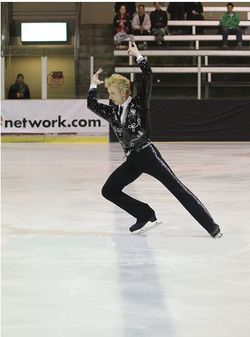
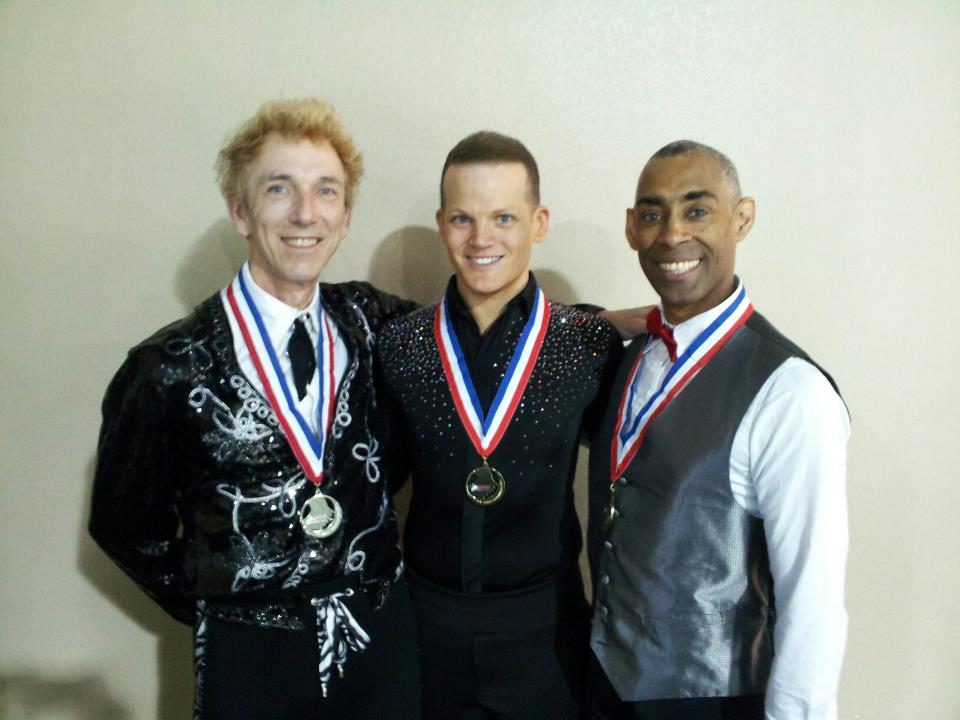
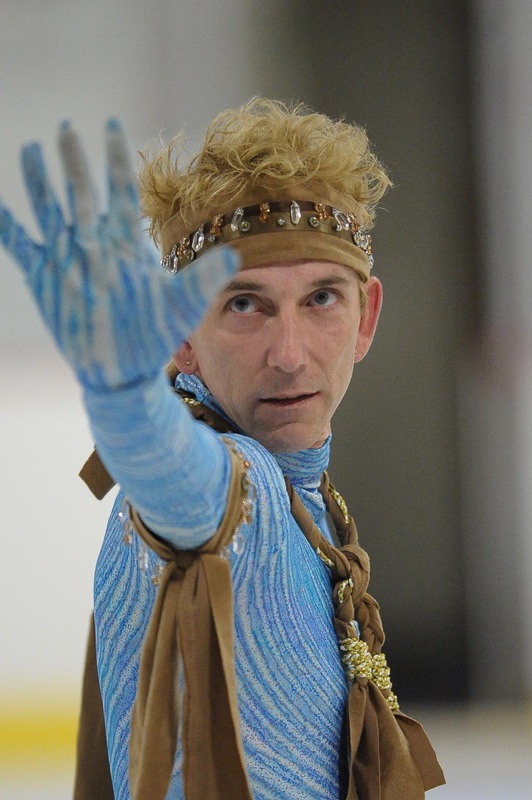
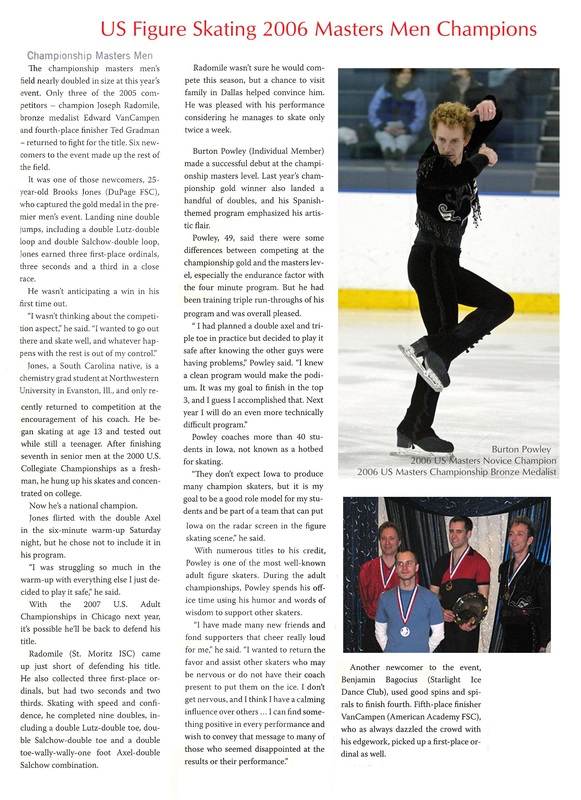
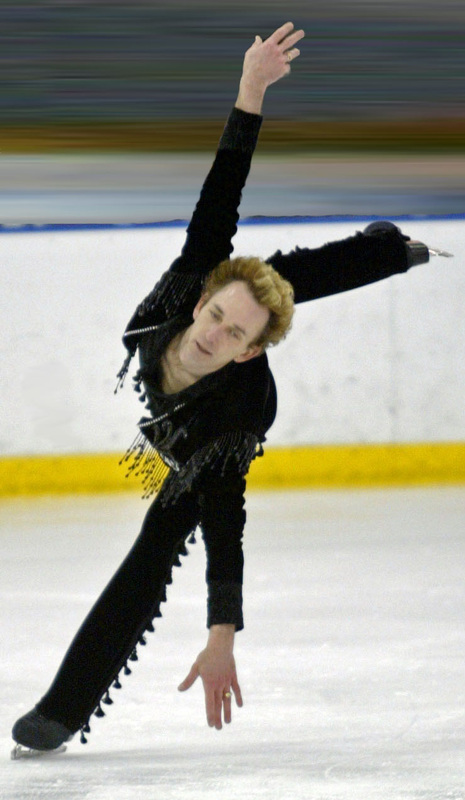
 RSS Feed
RSS Feed
